

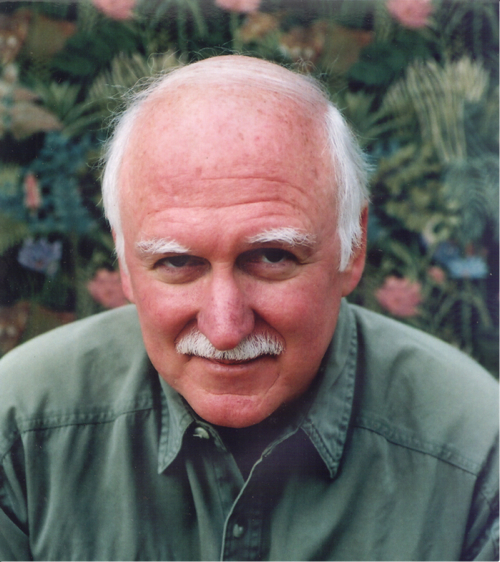
Jan Swafford's music has been played around the country and abroad by ensembles including the symphonies of St. Louis, Indianapolis, and the Dutch Radio; Boston's new-music groups Musica Viva, Collage, and Dinosaur Annex; and chamber ensembles including the Peabody Trio, the Chamber Orchestra of Tennessee, and the Scott Chamber Players of Indianapolis.
Over the years his music has evolved steadily, but in all its avatars his work is forthrightly expressive, individual in voice, and steadily concerned with lucidity of texture and form. Beneath the surface there are contributions from world music, especially Indian and Balinese, and from jazz and blues. The titles of his works—including Landscape with Traveler, From the Shadow of the Mountain, and The Silence at Yuma Point—reveal a steady inspiration from nature. The composer views his work as a kind of classicism: a concern with clarity and directness, pieces that seem familiar though they are new, that aspire to sound like they wrote themselves.
Also a well-known writer on music, Swafford is author of biographies of Ives, Brahms, and Beethoven. His journalism appears regularly in Slate. He is a long-time program writer and preconcert lecturer for the Boston Symphony and has written program notes and essays for the orchestras of Cleveland, Chicago, San Francisco, and Toronto.
FROM THE SHADOW OF THE MOUNTAIN (2001), for string orchestra.
Commissioned and premiered by the Chamber Orchestra of Tennessee, Chattanooga, September 2001. EXCERPT
ADIRONDACK INTERLUDE (2001), for orchestra.
Commissioned and premiered by the Skidmore College Orchestra, April 2002.
LATE AUGUST: Prelude for Chamber Orchestra on Southern Themes (1992). Full orchestra version, 1998.
Premiered by the Minneapolis Chamber Symphony, March 1992. Published by Peer.
CHAMBER SINFONIETTA (1988), for chamber orchestra.
Written for and premiered by Boston's Alea III, March 1988. Published by Peer.
Won Massachusetts Artists Council Grant 1989.
AFTER SPRING RAIN (1982), for orchestra.
Commissioned and premiered by the Chattanooga Symphony 1982. Published by Peer.
Won Indiana State University Composition Contest 1983. EXCERPT
LANDSCAPE WITH TRAVELER (1980), for orchestra.
Premiered in a public reading by the American Composers Orchestra 1988.
Published by Peer.
POINT: GENESIS: MATRIX: MUSIC FROM THE MOUNTAIN (1969-72), for wind ensemble.
First movement premiered by the Boston Conservatory Wind Ensemble 2012.
PASSAGE (1975), for strings, piccolo, and percussion.
Premiered by the St. Louis Symphony 1976.
Chosen for International Gaudeamus Festival 1977.
THEY THAT MOURN (2002), for piano trio.
In memoriam 9/11. Commissioned by Market Square Concerts for their 25th Anniversary celebration. Premiered by the Peabody Trio in Harrisburg, PA, April 2002. Published by Peer. Recorded on CRI. EXCERPT
REQUIEM IN WINTER (1991), for string trio or string sextet.
Written on an NEA Grant. Premiered by the Scott Chamber Players, Indianapolis, Nov. 1992. Published by Peer.
CAPRICES (1989), for piano and three winds.
Commissioned by the Sylmar Chamber Ensemble of Minneapolis. Premiered in Minneapolis, Feb. 1989.
THEY WHO HUNGER (1989), for piano quartet.
A Chamber Music America commission for the Scott Chamber Players. Premiered by the Scott Chamber Players in Indianapolis 1989. Published by Peer. Recorded on CRI.
MIDSUMMER VARIATIONS (1985; second version 1987), for piano quintet.
Commissioned and premiered by the Minnesota Artists Ensemble 1985. Published by Peer. Won Massachusetts Artists Council Grant 1989. EXCERPT
LABYRINTHS (1981), for violin and cello.
Premiered at Yale 1982. Won New England Composers Competition 1984.
OUT OF THE SILENCE (1979), for winds and strings.
Premiered in New York by Musical Elements 1979.
FLEURS (1978), for five flutists.
Commissioned and premiered by the St.Louis Flute Club 1979.
PEAL (1976), for six trumpets.
Premiered at Yale 1977. Chosen for the International Gaudeamus Festival (Holland) 1978. EXCERPT
THE GARDEN OF FORKING PATHS #3 (1974), for five winds.
Premiered at Yale 1974.
THE GARDEN OF FORKING PATHS #2 (1971), for flute and piccolo trumpet.
Premiered at New England Conservatory 1971. Published by Meridian.
STRING QUARTET (1968).
Premiered at Yale 1976.
IN TIME OF WAR (2007), for cello and piano.
Written for and premiered by Emanuel Feldman and George Lopez, New England Conservatory, May 2007. EXCERPT
IN TIME OF FEAR (1984), for flute and harpsichord.
Premiered in Deerfield 1984.
THE SILENCE AT YUMA POINT (2011), for solo cello. Written for and premiered by Rhonda Rider, February 2011.
A CELEBRATION WITH CATHY (2007), for solo viola.
Premiered by Ronald Gorevic, Smith College, November 2007.
MUSIC LIKE STEEL AND LIKE FIRE (1983), for solo piano.
Premiered Smith College 1985. Won Delius Competition'89.
IPHIGENIA (1993), for women's choir and ten instruments.
(Concert version with narrator.) Original theater version commissioned by the University of Tennessee. Premiered in Chattanooga, Nov. 1993.
SHORE LINES (1982), for soprano and flute.
Premiered in Deerfield 1983. Published by Meridian. Performed at National Flute Conventions 94 95. Won a National Flute Association Award for newly published work, 1995. EXCERPT
THE GOOD WOMAN OF SETZUAN (1977), for voices and chamber ensemble.
Premiered at the Yale School of Drama 1977.
MAGUS (1977), for cello and tape.
Premiered by Gerhard Pawlica at Boston University 1978. EXCERPT
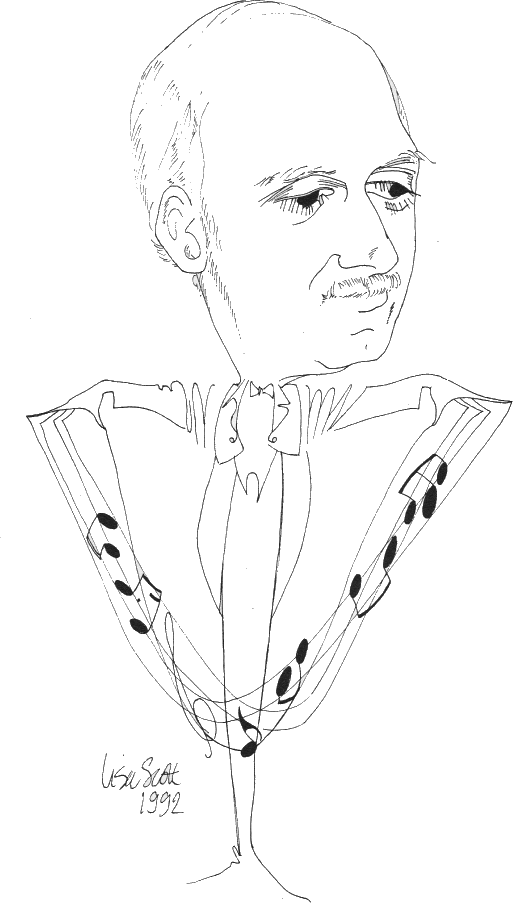
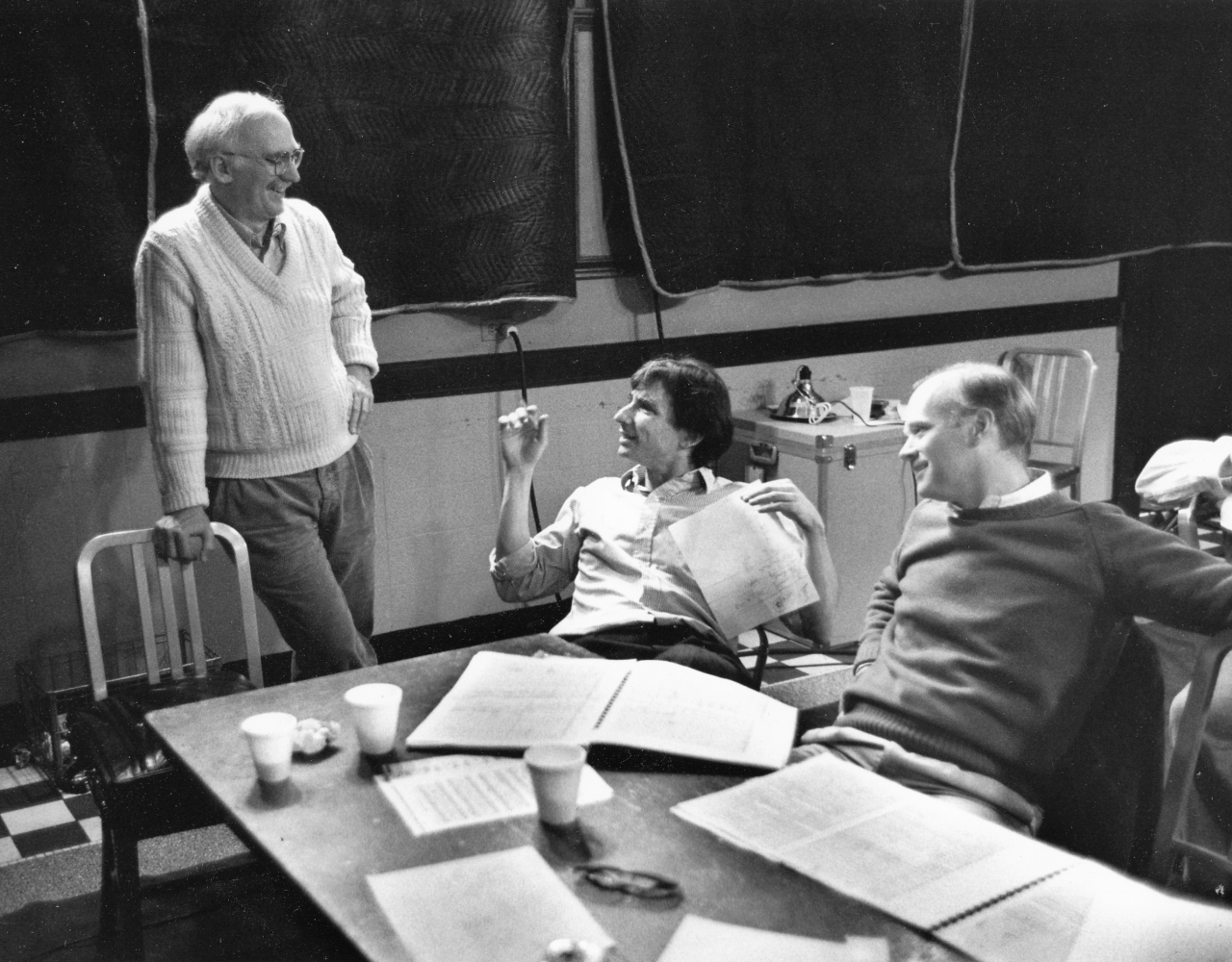 Jan Swafford, Michael Tilson Thomas, and James Sinclair during a recording of Ives's Fourth in Chicago.
Jan Swafford, Michael Tilson Thomas, and James Sinclair during a recording of Ives's Fourth in Chicago.
 With Gustavo Dudamel during Jan's lectures for the Los Angeles Philharmonic Beethoven Series, October 2015.
With Gustavo Dudamel during Jan's lectures for the Los Angeles Philharmonic Beethoven Series, October 2015.
 Leonard Slatkin introduces Jan to the Detroit Symphony at the start of his residency as visiting scholar with the orchestra's 2016 Brahms Festival.
Leonard Slatkin introduces Jan to the Detroit Symphony at the start of his residency as visiting scholar with the orchestra's 2016 Brahms Festival.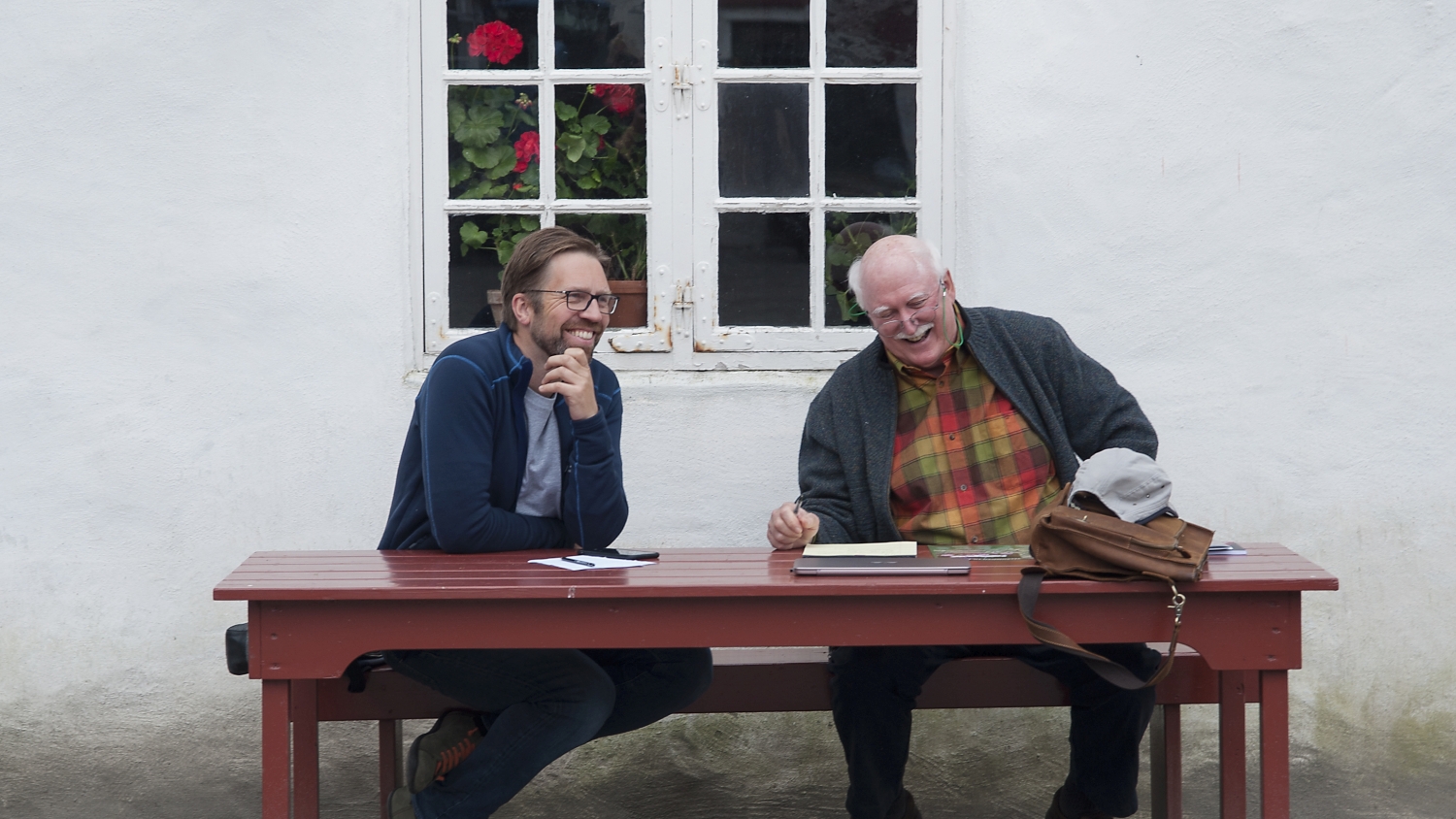
With Lief Ove Andsnes during Jan's residency with the Rosendal Chamber Music Festival in Norway, 2017.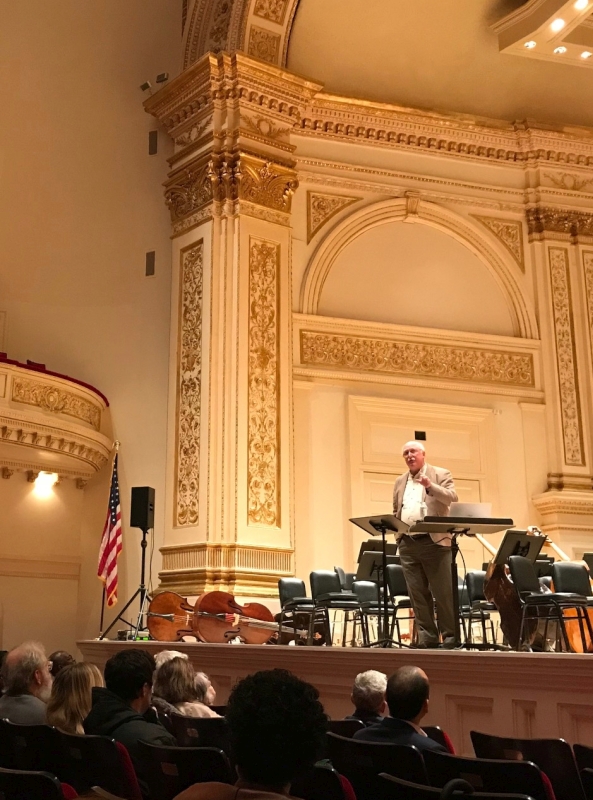
Preconcert lecture at Carnegie Hall before the Vienna Philharmonic
performance of their first Charles Ives work--the Second Symphony. 2017.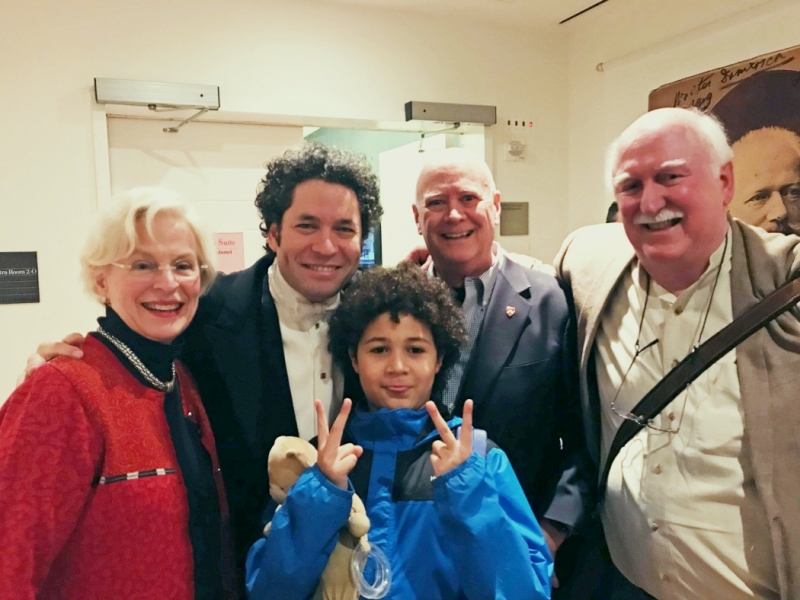
After the Carnegie Hall concert with Maestrao Dudamel and conductor and Ives editor James Sinclair and his wife. 
Beethoven book with still life and parking tickets, ca. 2008.
A search there for Jan Swafford will turn up extensive commentary on the Beethoven quartets and symphonies, plus a chat with Hilary Hahn about Charles Ives and a discussion about Beethoven with Dr. Gail Saltz, which was done at the NY 92nd St. Y last year. There is also an outstanding complete performance of the piano trio, They That Mourn.
|
A biography of Mozart, in progress. |
|
Language of the Spirit: An Introduction to Classical Music |
| Beethoven: Anguish and Triumph Houghton Mifflin Harcourt 2014.Editions in Spanish, Portuguese, and Chinese. BUY |
| Johannes Brahms: a Biography Knopf (U.S.) 1997, Macmillan (UK) 1998. Edition in Chinese. BUY |
| Charles Ives: A Life With Music W. W. Norton, 1996. BUY |
| The Vintage Guide to Classical Music Vintage (U.S.), Macmillan (UK), 1993; 2nd ed. 2001. BUY |
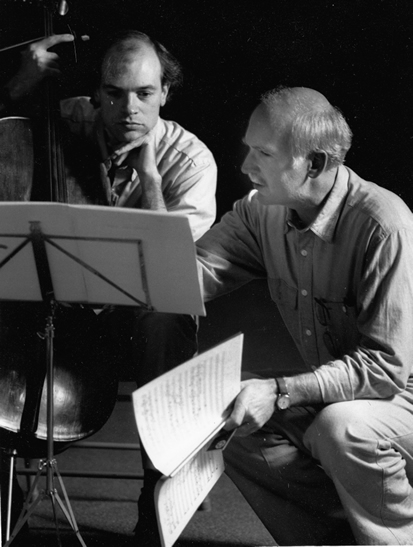
Jan with Perry Scott in Indianapolis.
| An introduction to Charles Ives written for Peermusic. |
| An essay on 20th-21st century American music written for the summer Aspen Music Festival. |
| "Ludwig Rules" An extensive guide for analyzing Beethoven. |
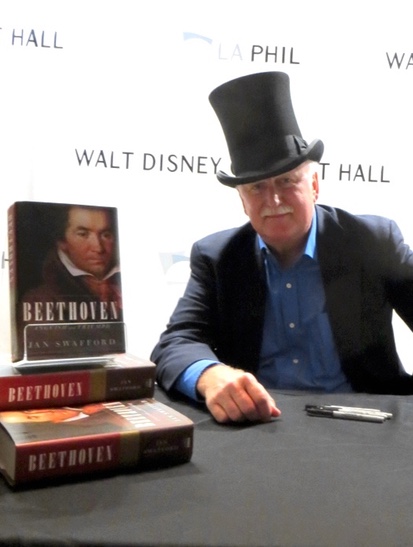
Signing books at Disney Hall during the Beethoven Series.
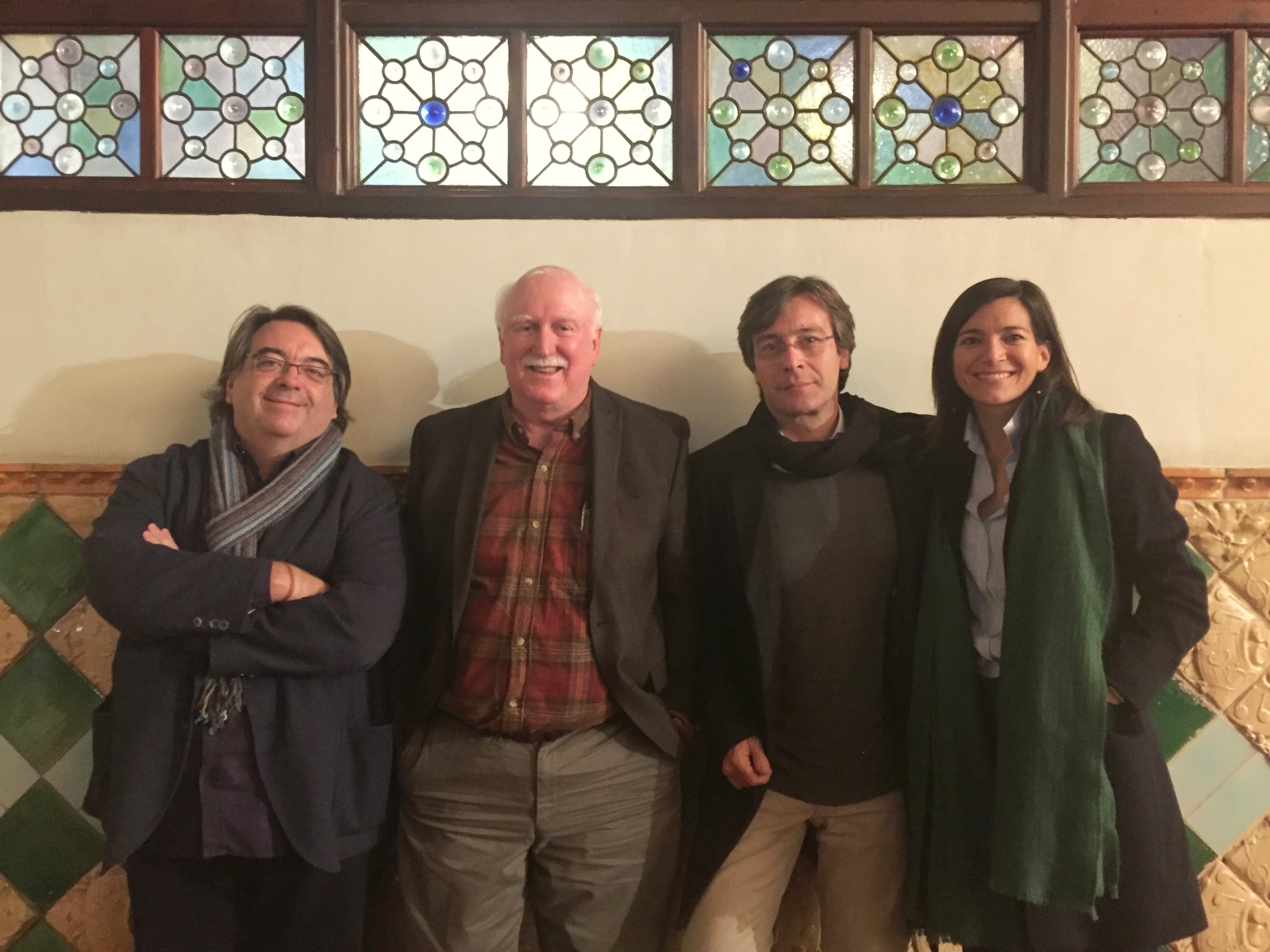
Kickoff for the Spanish Beethoven edition in Barcelona: l. to r. Jesus Ruiz Mantilla who reviewed the book in El Pais, Jan, translator Juan Lucas, and
publisher Sandra Ollo.
Shooting interviews for a forthcoming German TV documentary of Charles Ives, in Ives's relocated studio in the American Institute of Arts and Letters, 2018. With Anne-Kathrin Peitz, director of the film. 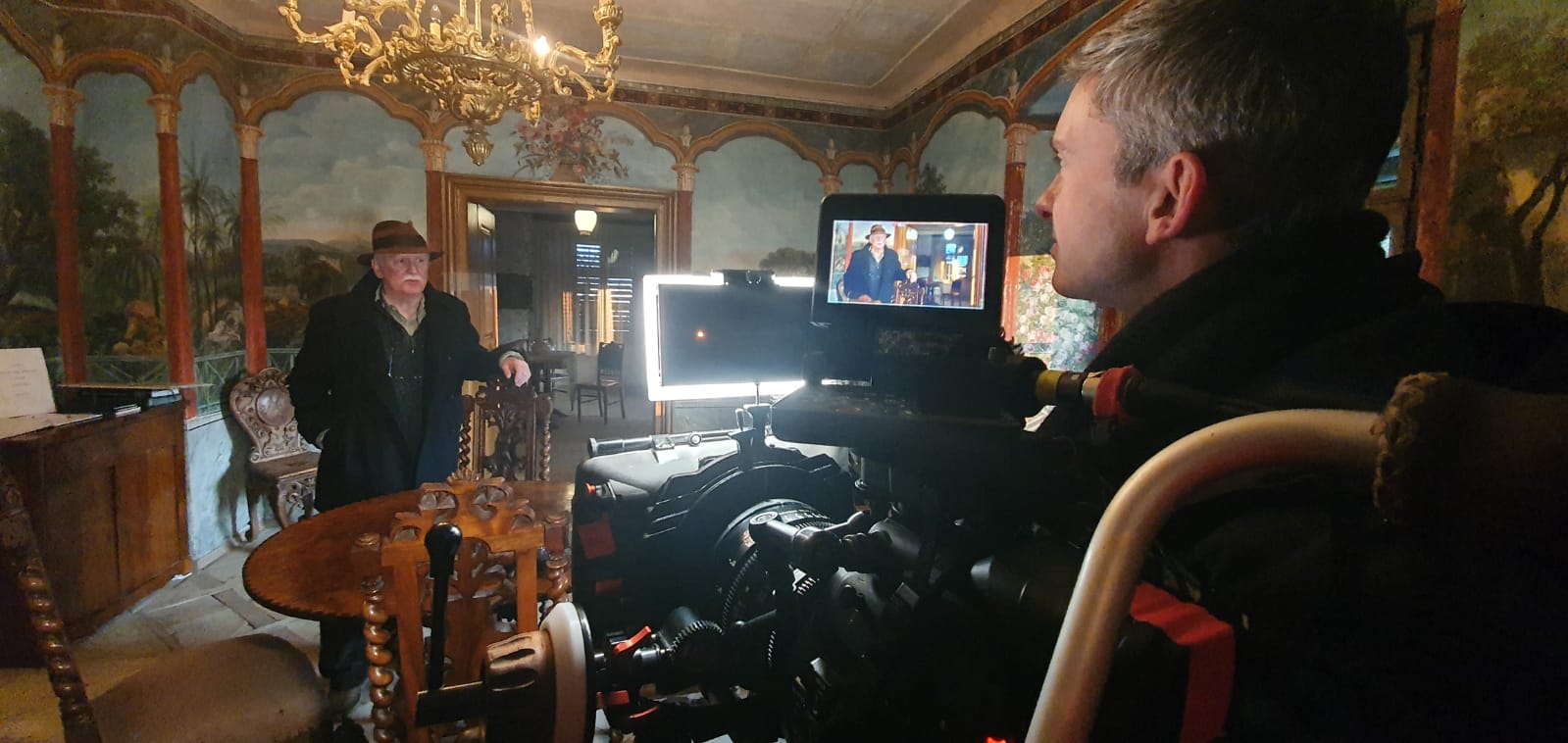
Shooting a BBC Television Beethoven documentary in Vienna, 2019.
Watch The Wild Moon of Rancho Cucamonga, a radio-style play by Joshua Fagin, in which Jan's readings of excerpts from his Beethoven biography are interwoven with a story of two prickly old friends. Also involved are excerpts from Beethoven recordings by Andrew Rangell that helped inspire the play.
| Slate | Music columnist 2002— The Most Beautiful Melody in the World, 2013. Being Brahms, 2012. Art That Grew On You, 2012. Learning to Love Mozart, 2012. Hallelujah for Leonard Cohen, 2012. Life in the Colonies, 2011. Cleaning Out Ives' Closet, 2011. A Grand Tour of Contemporary Music, 2011. The Elusive Maestro, 2011. The Art of Getting Art on Film, 2010.
Bold Prediction, 2010. The Wolf at Our Heels, 2010. In Search of Lost Sounds, 2010. Nature's Rejects, 2009. This American Composer, 2009. Great Composers, Lousy Reviews, 2009. Beethoven and the Illuminati, 2008. The Big Rewind, 2008. Ligeti: A Sound Odyssey, 2008. Bach on Top, 2008. Death by Oboe, 2008. Silent, Spooky, 2008. High Score, 2006. Classic Put-Downs, 2006. How Ives Jibes, 2004. Monteverdi Goes MTV, 2003. Speed Freaks Do Bach, 2003. The Beethoven Mystery, 2003. |
| The Guardian (London) |
Composers and Zeitgeists, 2004. Richard and Cosima Wagner, 2004. Ives and his Symphonies, 2003. Paint me a sound, 2003 Beethoven the Pianist, 2003. Brahms in Love, 2003. Once upon a time in America, 2003. Inventing America, 2003. |
| 19th Century Music | Did the Young Brahms Play in Waterfront Bars? 2001. |
| American Music | The Courtship of Charles and Harmony Ives, 1997. |
| Boston Symphony/Tanglewood Program | Program notes on Beethoven, Brahms, Ives, et al 1998— Beethoven's Seventh Symphony Ives' Ragtime Dances |
| The Metropolitan Opera | Program notes for Fidelio and Die Zauberflöte, 2016-17. |
| Chicago Symphony Program | Program notes on Brahms and Dvořák, 1998-9. |
| San Francisco Symphony Program | The War of the Romantics, 2001. Brahms and the Great Tradition, 2003. |
| Cleveland Orchestra Program | Brahms Concertos. |
| Detroit Symphony Program | Introduction for a Brahms Festival, 2016. |
| Toronto Symphony | Scripts for Brahms educational presentations, 2010-11. |
| Carnegie Hall Programs | Program notes on Bach, Brahms, Beethoven, 2006-7. |
| Aspen Music Festival | Program book leading essay, 2012. |
| Gramophone | Michael Tilson Thomas Records Ives (cover), 1989. |
| The Independent (London) | Brahms and His Rivals, 1998. |
|
Symphony
|
Ives Today, 2013. |
|
INTERNATIONAL PIANO |
Beethoven and the Piano, 2019. |
| PALAU DE LA MÚSICA (Spain) | Writing about Beethoven, 2019. |
|
CHAMBER MUSIC SOCIETY OF LINCOLN CENTER |
Program notes for Beethoven String Quartet series, 2019. |
|
ALPHA CLASSICS (FRANCE) |
Liner notes for complete Beethoven Piano Concertos, 2019. |
| Opera Magazine | Reviews of Debussy and Bernstein opera performances, 2005. |
| DEUTSCHE GRAMMOPHON RECORDINGS | Liner notes for complete Beethoven Symphonies recording, 2019. |
| Sony Classical Recordings | Liner notes for Millennium Series composers, 1999. Liner notes for Emanuel Ax/BSO Brahms 2nd Concerto, 1999. |
| Naxos Recordings | Liner notes for Charles Ives series, 2002— |
| BMG/RCA Red Seal | Liner notes for Tilson Thomas Ives recording, 2001. |
| Peer-Southern Concert Music | Charles Ives Brochure, 1998. |
| Musical America/Opus | Ives's Fourth Symphony, 1988. |
| Yankee Magazine | New England Eccentrics, 1983. Route 2 Memories, 1998. Blanche Moyse, Bach Festival, 1982. |
| Newsweek Japan & International | Violin Prodigy Midori, 1987. |
| New England Monthly | Summer Music in New England (cover), 1986. Charles Ives, 1986. The Vermont Symphony, 1987 The Portland String Quartet, 1985. Violinmaker Marten Cornelissen, 1985. New Conductors in New England, 1987. Music Critic 1985-90. |
Selected speaking engagements--
Boston Symphony Orchestra (preconcert talks 2003--); Carnegie Hall (Ives); Rosendal Norway Chamber Music Festival 2017 (Mozart) & 2019 (Beethoven); Detroit Symphony (Brahms); WIGMORE HALL, London, 2020 (Beethoven Piano Sonatas); BBC RADIO 3, 2020 (Beethoven); Manhattan String Quartet symposium in Krakow, Poland (Beethoven) and in Bonn, Germany (Beethoven); GRAND TETON AND SUN VALLEY MUSIC FESTIVALS 2019 (Beethoven); Los Angeles Chamber Orchestra (Elgar); Oslo Ultima Festival (Beethoven); Los Angeles Philharmonic (Beethoven); BEETHOVEN CENTER SYMPOSIUM, San Jose. 2020 (Beethoven's Chamber Music); Rockport Chamber Music Festival (Beethoven); Schenectady Chamber Music Series (Schubert); Barcelona Conservatory (Beethoven); Ottawa National Arts Center Beethoven Festival (Beethoven); University of Kentucky (Beethoven); talks with Dr. Gail Saltz at the 92d St. Y (Brahms and Beethoven); Camerata Pacifica of Santa Barbara (Beethoven); Pontificia Universidad Católica del Perú (Beethoven); Skidmore College (Ives); Texas Christian University (Ives); University of Arizona School of Music (Ives).
Interviews in the films Wagner’s Jews; Beethoven's Joseph Cantata; a German documentary on Charles Ives, in progress; two Beethoven films in progress on Fidelio and the late quartets.
| Composer in Residence of Market Square Concerts in Harrisburg, Pa., 1999-2002. |
| National Flute Association Prize for newly‑published flute music, 1995. |
| National Endowment for the Arts Composer Grant, 1991. |
| Massachusetts Artists Foundation Composer Fellowships, 1983 and 1989 (Finalist, 1988). |
| Grand Prize Co‑winner, Delius Composition Contest, 1989. |
| New England Composers Competition winner, 1984. |
| Indiana State University Composition Contest winner, 1983. |
| Rockefeller Grant and Meet the Composer Grants, 1982. |
| Vermont Council on the Arts Grant, 1979. |
| Rome Prize Alternate, 1978 |
| Tanglewood Fellowship, 1977. |
| Works chosen for the International Gaudeamus Festival in Holland, 1977 and 1978. |
| Five MacDowell and five Yaddo Fellowships 1978‑83. |
| Leonard Bernstein Scholarship at Harvard, 1964-8. |
|
Harvard College Honorary Phi Beta Kappa, 2017. Deems Taylor Award for online music writing, 2012. |
| Honors for Charles Ives: A Life with Music—
|
| Honors for Johannes Brahms: A Biography—
|
| Fulbright Fellowship to Vienna 1995. |
| NEH Fellowship (with Daria Sommers): Grant toward Ives television documentary 1991. |
| Harvard University Mellon Faculty Fellowship 1988-89. |
| Ingram Merrill Foundation Grant 1988. |
| Sinfonia Foundation Grant 1988. |
| Tanglewood Music Center 1977, composition with Betsy Jolas. |
Yale School of Music 1974‑77.
|
Harvard College 1964‑68.
|
| Kenyon College Summer Institute: adult classes on Brahms and Mozart 2016-17. |
| The Boston Conservatory: Professor of Composition, Theory, and Music History 2004—2014. |
| The University of Arizona: Visiting Assistant Professor of Theory and Musicology, spring 2002-3. |
| Tufts University: Writing Lecturer 1989-2015. |
| Harvard College: Mellon Faculty Fellow, taught seminar on American Music 1988-9. |
| Hampshire College: Visiting Assistant Prof. of Music, Director of Electronic Studio 1979‑81. |
| Amherst College: Visiting Assistant Prof. of Music 1980‑81. |
| Boston University: Assistant Prof. of Theory and Composition 1977‑78. |
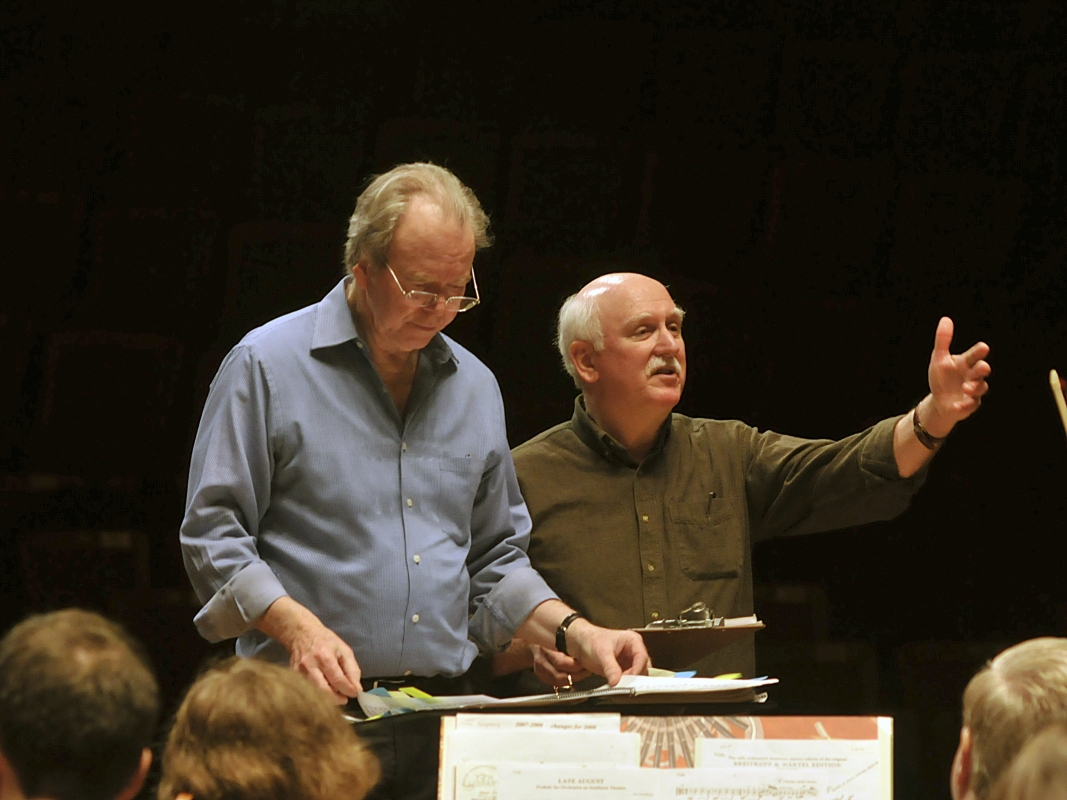 Jan with Max Hobart and the Boston Civic Symphony.
Jan with Max Hobart and the Boston Civic Symphony.
 Yuma Point, Grand Canyon.
Yuma Point, Grand Canyon.
Peermusic Classical
250 W. 57th St., Suite 820
New York, NY 10107
Tel: (212) 265-3910 ext. 17
Fax: (212) 489-2465
E-mail: peerclassical@peermusic.com
Email
Jan's email is janswaff@aol.com
Meridian Publishing
(913) 956-7270
E-mail: info@jangippo.com
© 2014 Jan Swafford | website design by ![]()